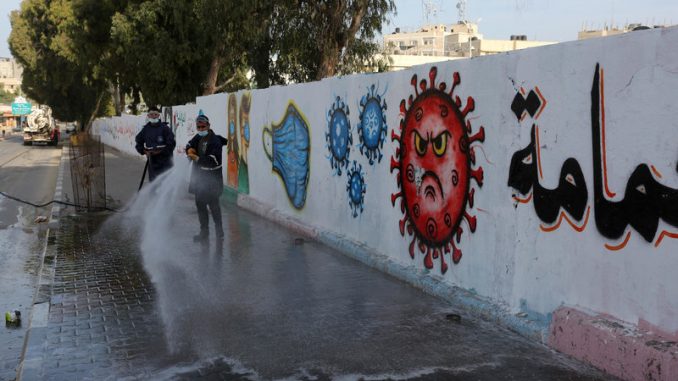Coronavirus surge leaves Palestinian health systems struggling

Workers spray disinfectant on a street in Deir al-Balah, central Gaza Strip, on 12 December.
Ashraf AmraAPA images
The health charity Medical Aid for Palestinians issued an urgent call on Monday for boosted emergency funding to Gaza.
The number of COVID-19 cases in the besieged territory has increased by more than 65 percent over the past three weeks, the charity stated, “stretching the capacity of Gaza’s beleaguered health system.”
Testing capacity is limited to around 2,000 tests per day and the health ministry in the territory temporarily ran out earlier this month. While the World Health Organization made an emergency shipment of kits, health authorities said they amount to only one week’s worth of supplies.
The provision of a “predictable flow of testing kits and supplies remains a major challenge,” WHO recently announced. The world body has been “a main supplier of testing kits to Gaza, which will be unsustainable in the long-run.”
WHO added that “additional resources are needed from the international community.”
“Critical gap”
Medical Aid for Palestinians warned that “there is a critical gap in local capacity to generate oxygen to treat COVID-19 patients,” including at the European Gaza Hospital, the main facility where coronavirus patients are being treated.
The health ministry in Gaza has had to “deploy oxygen generators from other hospitals and health facilities to cover current needs,” the charity adds.
Also on Monday, Gaza’s ministry of health said it needed 250 more hospital beds to treat COVID-19 patients.

“COVID-19 poses a disproportionate and substantial threat to a Palestinian society deliberately denied for decades the right to develop a functioning healthcare system,” the human rights group Al-Haq has stated.
COVID-19 is surging through sustained community transmission in both Gaza and the West Bank, according to WHO.
“The risk that the health system may reach capacity limits and get overwhelmed remains high,” the world health body stated last week.
Of the more than 128,000 confirmed cases of COVID-19 in the occupied Palestinian territories since March, nearly 25,000 are active. More than 1,100 people have died from the disease; more than 900 of the fatal cases were in the West Bank while over 200 were in Gaza.
Closures
In Gaza, weekend and nightly curfews have been imposed and most schools, as well as universities, mosques and markets, are closed.
The Palestinian authorities in the West Bank have restricted movement between governorates and have ordered closed retail and service stores, with the exception of pharmacies, bakeries, supermarkets and grocers.
All types of gatherings, including weddings, funerals and religious services, are currently prohibited, as is the case in Gaza too.

A vaccination national coordination committee has been established with the participation of the ministries of health in the West Bank and Gaza, as well as the international organizations WHO, UNICEF and UNRWA.
Frontline health workers and social workers will be the first to receive the vaccine, as well as people above the age of 65 and those with underlying health issues.
But questions remain over whether Palestinians will receive a vaccination other than the Russian Sputnik V.
“We’re in a state of uncertainty,” a senior official with the Ramallah health ministry told the Tel Aviv daily Haaretz.
“It’s also unclear when the vaccine will arrive in quantities that can really provide a solution for most of the population.”
Palestinian authorities lack the capability to handle large quantities of the Pfizer vaccine, which requires storage at very cold temperatures.
Israeli control over the West Bank and Gaza Strip’s commercial crossings presents another logistical hurdle to the expeditious provision of any vaccine to Palestinians living under military occupation.
Source: Palestine Responds

WRITE YOUR COMMENT